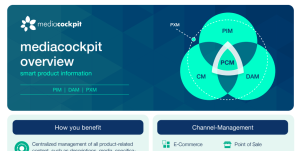Blog
5 Digital Shelf Strategies for your
E-commerce Success

According to a forecast by Statista, global e-commerce sales will reach a volume of 5.9 trillion euros by 2029. To stand out as a brand in this fiercely competitive landscape, a comprehensive marketing and product communication strategy is essential.
Here’s how you can dominate the digital shelf.
What is the Digital Shelf?
The digital shelf encompasses all digital touchpoints and content a consumer sees
when searching for a product.
This includes: Product pages, images and descriptions, reviews, prices and promotions. The digital shelf is crucial in e-commerce as it provides the first impression of a product and significantly influences the consumer’s purchase decision.
Key aspects of the Digital Shelf include:
How to Optimize Your Digital Shelf to Attract Customers
1. Gradually increase your reach
The digital shelf, much like a retail shelf, is where products are displayed and sold. However, unlike physical stores, the digital shelf spans multiple channels and platforms such as:
- Direct-to-Consumer (DTC) websites
- mobile apps
- social media
- online marketplaces
Today’s consumers switch dynamically between these options.
The aim of every brand must therefore be to position its own products as widely as possible, whereby the principle of “quality over quantity” should always be taken into account. Therefore, every brand must aim to position its products widely, keeping in mind the principle of “quality over quantity.” Poor product presentations can make a brand appear unprofessional, driving potential customers directly to competitors, which are only a few clicks away in the digital space.

2. Optimize your product presentations
Products must stand out in the crowded digital space and allow consumers to “experience” them, even though they can’t touch or try them online.
In addition to basic, sales-relevant product information, this requires appealing rich product content, i.e:
- detailed descriptions
- Illustrative materials such as images, videos and 3D renderings
- Additional documents such as user manuals, catalogs and certificates
By optimizing your product presentations, you can capture the interest of potential customers, encourage further research, lead them to additional touchpoints and thus also boost cross-selling. With SEO-optimized content, you can also increase the visibility of your products and brand.
3. Convince as a brand at every touchpoint
Your product presentations always serve as a digital showcase for your brand. Regardless of whether you sell your products directly on your website, via your own online store or via online marketplaces such as Amazon. This makes it even more important to design them attractively and invest in high-quality content.
Ultimately, however, e-commerce success also hinges on your overall digital presence, brand reputation and the associated trustworthiness.
Promote this through:
- high engagement on social media
- interaction opportunities throughout the entire customer journey
- responsive customer service
This approach helps you to quickly convert potential customers into buyers and build long-lasting customer relationships.
4. Leverage Data-Driven Channel Strategies
Using digital channels in a scattergun approach is neither efficient nor effective. This is because each individual channel has different target groups, conventions and requirements that need to be taken into account in communication. It is therefore better to segment the channel landscape and tailor your brand and product messages accordingly.
Today, AI tools and data analysis enable you to measure the success of the approach and optimize content accordingly. This brings us to digital shelf analytics. Without analyzing and adjusting your strategies, you’ve only taken the first step toward success. Personalization also plays a role in success.
Whether through tailored product recommendations, social media ads or email campaigns – personalized marketing also strengthens customer loyalty and brand loyalty.
5. Master the digital shelf with mediacockpit
Implementing these digital shelf strategies is challenging and resource-intensive without software support. Efficient and effective brand and product communication in the digital space requires a solid technological foundation.
This is where the software products Product Information Management (PIM), Digital Asset Management (DAM) and Channel Management come into play for the management and control of product information, media content and channels.
Our mediacockpit platform integrates all these disciplines, providing a one-stop solution for product content experiences and impressive market presences on the digital shelf. The download clearly shows how mediacockpit combines PIM and DAM and which channels can be easily used from there.
Highlighted Whitepaper
Manifest: One-Stop Product Content Experience
Met One-stop Product Content Experience helpen we onze klanten om hun individuele toekomst in de markt op een duurzame en veilige manier vorm te geven.
Samen meer bereiken
Wij geloven in de waarde van samenwerking en uitwisseling. Dit geldt zowel de projecten met onze klanten, waaruit we veel waardevolle inzichten genereren voor onze productontwikkeling, als voor ons groeiende partnernetwerk, waarmee we onze klanten ondersteunen bij hun digitalisering.




